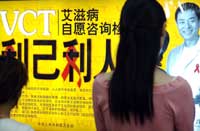|
Hospitals find profit in AIDS, undermine Chinese government's initiatives
By Peter S. Goodman (Washington Post)
Updated: 2005-11-09 10:34 In the past two years, President Hu Jintao and Premier Wen Jiabao have made
high-profile visits to AIDS patients in hospitals, and educational billboards
are increasingly visible.

Two women read a poster
advocating AIDS prevention in a subway station in Beijing October 27,
2005. China is to issue a national regulation on the prevention and
control of AIDS at the end of this year.
[newsphoto] | Backed by a $95 million grant
from the Global Fund to Fight AIDS, Tuberculosis and Malaria, the government
launched the drug program, aiming to supply 30,000 people with free
anti-retrovirals by the end of the year.
About 2,000 of the 19,000 patients who have received free drugs have stopped
taking them because of side effects such as low blood pressure, insomnia, and
nausea, according to medical experts.
In many areas, the campaign is encountering resistance from doctors who would
rather prescribe expensive medicines than give away something for free.
"The reform process has made hospitals into clubs for the rich," said Zhang
Ke, an AIDS specialist at Beijing Youan hospital. "If the hospital is focused on
making money, why would they tell anyone about these free drugs? There's a basic
conflict of interest."
The effort here in the southwestern province of Yunnan is a test of the
state's resolve. Near the meeting point of Burma, Thailand and Laos, a major
source of opium, Yunnan has many intravenous drug users.
The sex trade has flourished here with the growth of organized tourism.
Yunnan was among the first provinces opened to foreign aid groups such as the
Clinton Foundation, which is dispensing free anti-retroviral drugs to children.
Until this year, Cai, who agreed to speak on condition she be identified by
her last name alone lest she jeopardize her access to care, knew little about
AIDS. In April, she landed in the hospital with pneumonia. On the way out, one
of the doctors took her aside.
Was she a drug user? No. Had she had a lot of sex partners? No. She was 34
years old and married, the mother of two boys. She ran a stall selling clothing.
She had no insurance. She had tested positive for HIV, the virus that causes
AIDS.
"I collapsed," she said. "I couldn't breathe."
Her husband confessed that he had been cheating, she said. She left him, but
he forced her to give up the children, she said. An aunt reluctantly took her
in, though Cai was not allowed to use the bathroom or eat with the family.
On May 25, Cai went for treatment to the Number Three People's Hospital
special AIDS ward. She received an X-ray and an ultrasound. The radiologists
whispered that they should not touch her. "She's got that disease," she heard
one doctor say.
She surrendered a $375 deposit, nearly all the money she had. They gave her a
bed in a room with three other women. The toilets were filthy. Bowls of rice
contained sand and worms. Trash piled up. Bed sheets went unchanged.
After a week, the hospital told her that her money was used up and demanded
more. She told them she couldn't afford to stay.
|